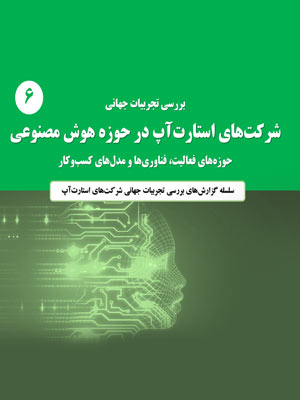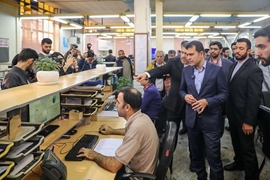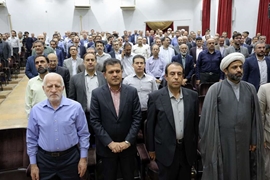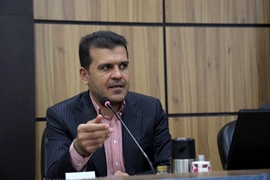Dehghani in a meeting with activists in the fields of fertilizers and social innovations.
The development of social innovations prevents social damage caused by technological innovation.
The vice president of science, technology, and knowledge-based economy, pointed out that technological innovations, along with their many benefits, also bring harm and social gaps, called the development of social innovations necessary to prevent and control social harms caused by technological innovations.

According to the communication and information center in the vice presidency of science, technology, and Knowledge-based Economy, Ruhollah Dehghani, spoke at a gathering of social activists in the field of non-governmental organizations to investigate the possibility of knowledge-based recognition of innovative non-governmental organizations, expressed his condolences for Muharram and mourning of Imam Hossein (PBUH) stated: The concerns that were raised in this meeting are also my concerns. By the way, in the same one, two months after the beginning of my responsibility as the Vice President of Science, in a meeting with Dr. Zamanian, I brought up the topic of inclusive innovation and we had a discussion and exchange of views.
He pointed out that the initial definitions of innovation as a new category were mainly technological. Technological innovations that are formed based on the creation and development of technology, despite the benefits they have, also cause harm, one of the most important of which is the creation of new gaps and faults in society, which from time to time, due to the difference in the potential of the two sides of the gap, large earthquakes create in the society.
He pointed out that technological innovations have led to the formation of a generation of scientists, scholars, and sometimes rich thinkers who ride on the people.
A clear example of this is Uber, which has destroyed the entire traditional taxi system, local offices, and the multitude of businesses and services related to this area, and in return has given huge benefits to a small elite community.
We see other examples of such technological innovations in our own country, where suddenly the market has destroyed a huge number of retail stores and local shops and storekeepers, etc.
Stating that knowledge-based governance requires us to prevent or at least control the creation of new gaps in society, Dehghani pointed out: the harms of technological innovations led to the formation of another category under the title of social innovation, the audience of which is mainly innovations made by ordinary people and non-scientific talents. Experience has shown that countries that pay attention to social innovation in addition to technological innovations are more successful in controlling social gaps and faults, and by the way, they have a better economy. So, both as a personal opinion and based on global experience, I believe in the category of social innovations, which has received less attention in our country.
Referring to the opinions expressed in this meeting, he said: The debate is whether we want to make charities and foundations knowledge-based or whether we want to use a network of knowledge-based organizations to serve charities. If we want to make charities knowledge-based, we will encounter problems that go back to the text of the law, and therefore the process of changing it is very time consuming, but the regulations can be changed. First, we have to see exactly what we are looking for and what can help our seeds and use the available capacities based on that.
The vice president of science, technology, and knowledge-based economy noted: Both the president and the government believe in popularizing a separate economy, so good regulations can be approved to support social innovations.
He suggested that a joint working group be formed with the presence of Dr. Haghjooy Javanmard - the head of the Strategic Technologies Development Center - and Hasanlu - the head of the soft technologies headquarters - from the vice presidency of science and two representatives from Semen to create a new model within one or two months.
In the end, he invited the activists in the field of charities and social participation to have innovations in the definition of good work and clarified: Good work is not only helping disadvantaged children to continue their education and building clinics and mosques, etc., and helping a young graduate or a start-up company of a group of energetic graduates who sometimes studied with the support of the same benefactors and in benevolent schools is also a good deed and perhaps more valuable than the usual good deeds. Of course, the purpose of helping knowledge-based companies is not to give them cash, but rather to accept risk and venture investment, which can provide the basis for the growth of these groups and the prosperity of their production and job creation.
At the beginning of this meeting, before Dehghani's speech, a group of social activists of non-governmental groups present in the meeting expressed their views and opinions regarding the innovative and knowledge-based aspects of Semen's activities and the necessities and problems of these groups covered the law and regulations of knowledge-based companies.
Dr. Zamanian, one of the activists in the field of social innovation and voluntary activities, stated that according to international documentary reports, the total economic value of voluntary activities in the world is such that if we consider this collection as a country, it will be the fifth economic power in the world. He had: Benefactors and the community of Semens have virtues that are not less than basic knowledge, therefore, they have not turned to the vice presidency of science to obtain basic knowledge and use the facilities granted to knowledge-based companies, such as loans and tax exemptions, but through the sense of affinity with the knowledge-based ecosystem and the transcendental approach that governs it, they hope to be able to use the experiences and capacities of this ecosystem to expand the ecosystem of non-governmental activities.
In the following, Rasouli, social innovation activist, presented the report of the Foundation for Social Excellence of Life regarding the relationship between Semen and the field of knowledge-based blocks of semen and the obstacles to the development of knowledge-based semen.
He said about the role of semen in the economy: In 2016, the gross value created by non-governmental organizations in the United States was about 1047 billion dollars - equivalent to 5.6 percent of the country's gross national product - and in 2022, it will be more than 12.5 million Americans have been employed by non-profit organizations.
In expressing global experiences in the field of knowledge-based foundations, he introduced the activities of several charity platforms and collections of knowledge-based non-governmental organizations inside and outside the country.
Rasouli continues by referring to the clauses of the regulations for the recognition and support of knowledge-based companies and institutions, in which the definition of a company in the commercial law is cited and indicators such as having a stable specialized customer, operating income, the amount of research and development expenses, the number of active human resources is the basis of recognition of knowledge-based companies.
Mahdi Maskani, an activist in the field of non-governmental organizations, referring to the knowledge-based experience of Semen, in which he works, stated: The regulations for supporting knowledge-based companies are set in such a way that most of the Semen are subject to many supports if they are recognized as knowledge-based. They are not like bank facilities. To solve this problem, we must add social indicators to the company's validation indicators, which are the basis for banks' decision-making.
A researcher in the field of non-governmental organizations also stated: the existing firms themselves should move from traditional and low-interest activities to innovative works with high productivity.














comment